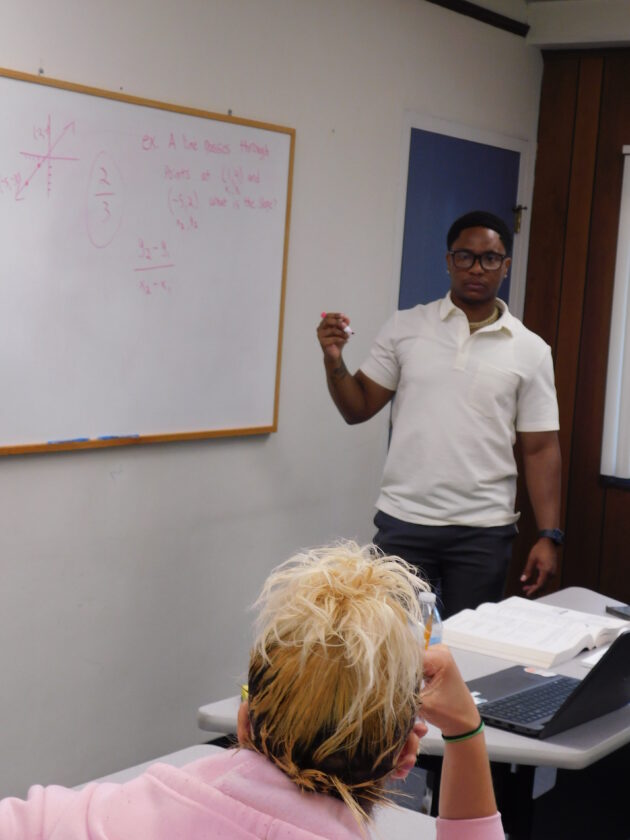
5 minute read
Eastern Ohio Aspire thrives under new leadership, celebrates more than 40 graduates
Dedicated staff at the Aspire adult education program did not miss a step when transferring to the Jefferson County Educational Service Center as fiscal agent with the closing of Eastern Gateway Community College. Operating with the full support of JCESC since last summer and rebranded Eastern Ohio Aspire, the program has graduated more than 40 students from July 1, 2024, through June 30, 2025.
Funded by the Aspire grant through the Ohio Department of Higher Education, Eastern Ohio Aspire assists with high school equivalency diplomas and offers services for English speakers of other languages, integrated education and training, correctional education, distance learning, and workplace and family literacy. The program covers Jefferson, Belmont, Harrison, Carroll, Columbiana and Mahoning counties.
Director of Transitions Christina Wanat said Aspire is proud of the number of graduates. The program kept up its mission without disruption as it moved under JCESC’s auspices.
“The ESC made the transition very smooth for the staff and students. That was a welcome benefit,” she said.
Students who pass Aspire’s preparatory classes then take the test to earn their high school equivalency diplomas.
Wanat said the Aspire program is personalized. When students begin, instructors assess their skills to determine what areas need additional focus, whether reading, writing, or math.
The transfer has meant a change in locations. Aspire now offers classes out of the Jefferson County Community Action Council in Steubenville as well as the Jefferson Metropolitan Housing Authority JFK building. Aspire often holds classes in the Department of Job and Family Services facility of the other counties served.
A student’s time studying with Aspire varies due to their skill level and the help they need to prepare for the test.
Jermel Bailey, director of data and compliance, can be found in the JFK classroom teaching a group of adult students. He looked back on Aspire’s first fiscal year with JCESC.
Eastern Ohio Aspire hit its stride and immediately went to work getting word out. The first task was retaining students when many were accustomed to Aspire’s location at Eastern Gateway.
“New students were trying to figure out where we were because they were so used to hearing about us being with Eastern Gateway,” he said. Bailey said JCESC’s support was vital in promoting the new operations.
“We were able to find our footing, get everybody in the positions they need with getting new staff on board,” he said. “We had a pretty successful first year and look forward to seeing how things go in the future.”
Aspire personnel also were hard at work building new partnerships throughout the counties they serve. These include the Community Literacy Workforce and Cultural Center at Lowellville in Mahoning County, which offered Aspire space to hold adult basic education classes and English as a second language classes.
“We started up there,” Bailey said. “Just kind of built our presence in that area. We’re still in the process of letting it be known that we’re there. That was one partnership that we’re proud of, that we were able to make happen.”
The program has partnered with Lighthouse Counseling and Meditation to provide continuing education to those recovering from addiction. Additionally, Aspire educators work with people in the corrections system to develop workplace literacy skills once they are released.
Aspire maintained partnerships with Ohio Means Jobs in different counties.
The transition to JCESC has equipped Aspire with some tools to strengthen its online classes. Bailey said students find online learning an important option since it offers flexibility for learners who have jobs, families, children, and other adult responsibilities and want to pursue their education.
The Aspire program is known for investment in student success and working with students one on one to identify and bolster students’ weak points and make certain they are not falling through the cracks. While at EGCC, Bailey said personnel were concerned about online learning and if educators could remain closely involved to make certain the students are mastering the material.
However, Bailey said the transfer gave Aspire the benefit of JCESC’s Virtual Learning Academy and its user-friendly and highly responsive features.
“They were able to help us tremendously by offering us their platform,” he said. He added some students prefer to learn at their own pace, and the material is catered directly to what they will need to take the high school equivalency test.
Bailey said the online courses offer the structure of a definite window, but a wide one, to complete assignments.
“That transition has helped a lot,” he said. “We want to be able to offer as many possible classes and times for students.”
Aspire is looking at the obstacles students face and how to remove them. Bailey said new students are required to complete the Test of Adult Basic Education online, but some students do not have computers or internet access at home, so staffers can offer to let them take the test in an Aspire office.
Aspire personnel are speaking with other potential partners that might host remedial classes in reading or for English speakers of other languages.
“We’re just looking to help in any avenue we possibly can,” Bailey said. “The future is looking pretty wide open.”
Bailey commends the Aspire staff and educators for their hard work.





